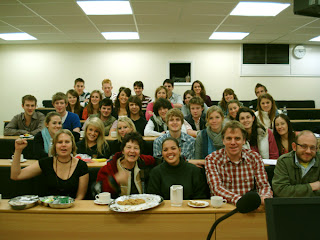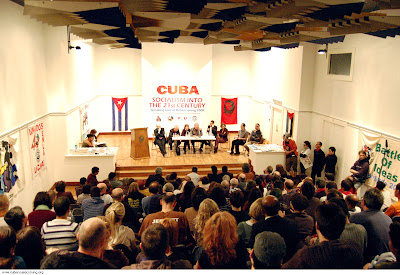Socialism into the 21st century – dayschool at London School of Economics (LSE) – 1 March 2008Following ten days of meetings around the country, the Rock around the Blockade (RATB) 2008 Cuban speaking tour came back to London for a dayschool of workshops and discussion. The event was hosted by the LSE Fight Racism! Fight Imperialism! Society and attended by 150-200 people. Hassan Javid, the chair of the society, introduced the speakers at the first session, following which Helen Yaffe spoke on behalf of RATB and Yoselin Rufin, Orlando Borrego and Jesus Garcia all made introductory speeches prior to the meeting breaking into workshops to discuss the topics in greater detail.
Orlando Borrego told the audience how impressed he had been during the tour with the level of questions and the detailed knowledge some young people in Britain have about Cuba. He had been especially struck by a group of school students who had come to the Glasgow meeting. And he was also very pleased to see the level of interest in Che, not just as a guerrilla fighter depicted on a T-shirt, but as a serious political thinker.
The meeting then split into three workshops and in the final plenary session of the day three comrades reported back from these discussions.
Young People and Education in Cuba (Yoselin Rufin)Annie from North-East FRFI reported that Yoselin had spoken about the role of mass organisations in Cuba in the development of young people from the earliest age. The discussion covered literacy, classroom sizes, lack of bullying in Cuban schools and the contrast between the visible thirst for knowledge in Cuba and lack of interest in education imperialist countries. In Cuba education is focussed on the whole person. Everyone can go to higher education and realise their full potential. At the same time it is recognised that people have different intellectual abilities and classes in schools are multi-ability with more able pupils assisting the less able, in stark contrast to schooling in Britain which divides in order to discard the less able pupils and make them feel worthless.
Democracy and popular participation in Cuba (Jesus Garcia)Sam from London RATB reported that the workshop had discussed race and equality, the role of mass organisations, the relationship between the Communist Party of Cuba and the state, and the problems of bureacratisation (burocratismo). While the title of the discussion referred to ‘democracy’ it is a term Jesus prefers to avoid as it has been abused. A contributor to the workshop pointed out that when imperialists talk about democracy, what they mean is democracy for the ruling class.
The legacy of Che Guevara (Orlando Borrego)Helen from RATB reported that Borrego had spoken about Che’s early life in Argentina, his travels through Latin America, his meeting with Fidel and Raul Castro and participation in the Granma expedition. He then went on to describe Che the economist, who developed the Budgetary Finance System for Cuban industry after the revolution. Che was adamant that leaders must not be separated from the people and that all leaders and managers must do voluntary productive manual labour. As a result he would work in the mines despite suffering from acute asthma.
The full meeting then had further discussion on these and other topics, including the press attacks on Cuba in Britain, the relationship between the Cuban state and other countries, including Iran and the former Soviet Union and how Cuba is tackling racism. Contributions were made by members of the Revolutionary Communist Group, Communist League and North London CSC and by comrades from Iran, West Africa and the Caribbean. Some speakers made comments about the role of the Soviet Union in supporting Cuba in the time after the revolution, stating that the USSR did not really care about developing socialism in Cuba but was only acting in its own interests. Comrade Borrego responded to by saying that Cuba was never ‘a satellite’, that after the Missile Crisis, when the USSR had wanted Cuba to accept an inspection of the island, Cuba had refused, and that the relationship was not one-sided as the USSR had also needed Cuba’s support against attempts to isolate it.
The final contribution from the platform was from David Yaffe, who said:
‘Cuba represents the vanguard in the long struggle ahead to create “another world” – to build socialism. Cuba is in the vanguard of the world fightback against imperialism, having withstood the mightiest empire the world has ever seen for the past 50 years. That is why all real socialists and progressive people throughout the world give their solidarity and support to the Cuban revolution.
‘In imperialist Britain we can best consolidate our support for the Cuban revolution by beginning the process of building a new socialist movement here.’
He then spoke about the vicious and dishonest coverage in the British press that followed Fidel Castro’s announcement he would not stand for election as president, and how, that sections of the British left repeated the same lies showed the absolute urgency of building this movement. Such a movement cannot be built without breaking from the Labour Party, whose leaders ‘personify parasitic capitalism’.
‘Opposing the war in Iraq and Afghanistan means totally breaking with the Labour Party. Opposing racist immigration laws and defending asylum seekers means totally breaking with the Labour Party. Opposing the increasing privatisation and fragmentation of the NHS and state education means totally breaking with the Labour Party. To build a socialist movement in Britain we must stand in solidarity with all those throughout the world resisting imperialism. To build a socialist movement in Britain we must stand in solidarity with socialist Cuba and the developing revolutionary democratic states in Latin America.
‘We must start now and build a new tradition that breaks with the sectarian attitudes in the British labour and left movement. It is no longer acceptable that some who call for solidarity with Cuba can, at the same time, call for a boycott of this speaking tour. Bob Crow, General Secretary of the RMT, made the point when he said he felt sorry for those who hadn’t got involved in it because they said it was some kind of sectarian enterprise, because it is they who are the sectarians and who are missing out.
‘The latest global financial crisis, triggered by the downturn in the US housing market, threatens to halt the relentless expansion of credit that has been the driving force behind economic growth in the major capitalist countries over the last 60 years. This will have serious social consequences. In Britain the reactionary Labour government is preparing for this outcome by attacking the working class. Labour is tightening further its ‘welfare to work’ regime and cutting the wages of public sector workers. Attacks on democratic rights to protest and organise will be strengthened. Increased surveillance and police powers will become the norm.
‘The decision to build a new movement cannot be delayed. From the Cubans we know another world is possible – a socialist one.
‘If you’re not in RATB join it today. If you’re in RATB and not in a socialist organisation, begin to work with the RCG today. Read and write for Fight Racism! Fight Imperialism!, a newspaper that stands on the side of those fighting for socialism and against imperialism throughout the world.’
Viva Cuba socialista!
Viva socialism!
Let us build a new socialist movement in this country!





























